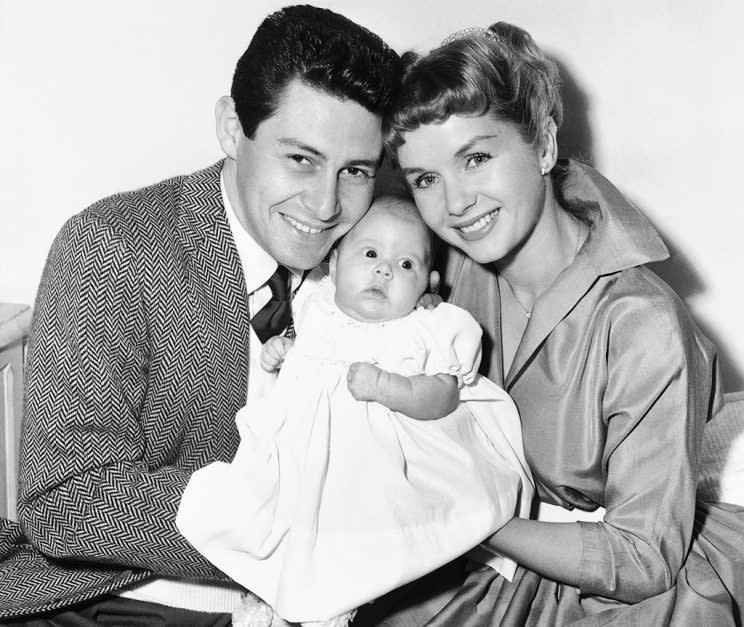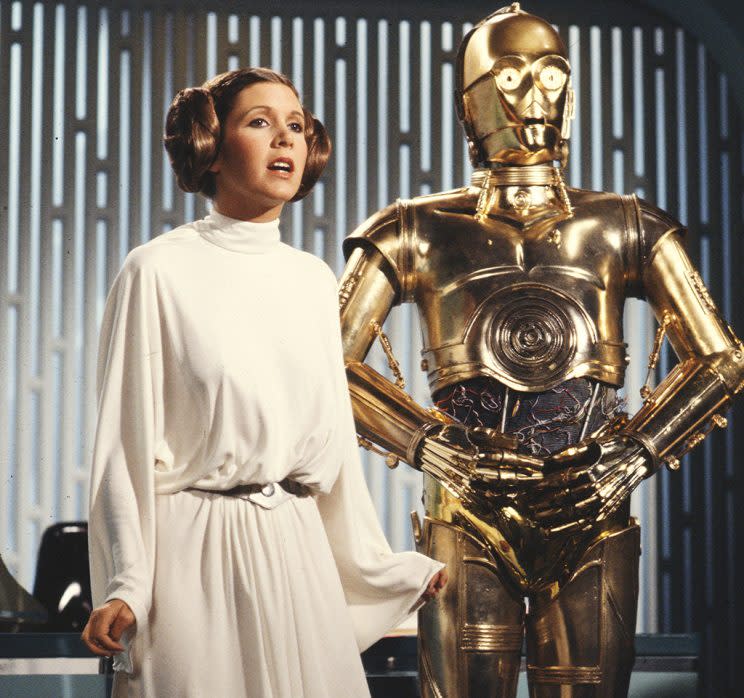Carrie Fisher: A Look Back at Her Colorful Life

Carrie Fisher will best be remembered for her iconic role in Star Wars; however, she had a similarly colorful life off-screen. No one was more open about her struggles navigating through life and Hollywood than Fisher herself.
From mental illness to substance abuse, Carrie used her quick wit to write numerous novels and nonfiction books — including the recent The Princess Diarist — about her journey.
Carrie was a star in her own right, but was born into Hollywood royalty. However, trouble at home started when she was still young, as her parents, singer Eddie Fisher, and her actress mother, Debbie Reynolds, divorced when she was 2. Eddie famously left Debbie and their two children for his wife’s best friend, Elizabeth Taylor.
Carrie, who often described life’s tribulations with comic flair, said her father “basically fled the scene of the accident,” and noted that she “saw him more on TV than on the planet.”

“My father really blew his wad by being this man that abandoned women and children,” Carrie later said. “He was this Lothario. And he was more interested in pursuing p**** than his career. Yeah. It was performing, p****, performing, p****. P****. That’s what he’s also in bed for. He spent most of his life in bed in another way, and now he’s resting.”
Eddie and Carrie reconciled before his death in 2010. However, she was never too shy to discuss their troubled relationship early on. “My dad and I used to do drugs together. We were like badly behaved children,” she told People.
In 1970, Carrie started to exhibit signs of bipolar disorder, but her condition was not diagnosed for over a decade.
“My illness took hold when I was 14 or 15 years old — my father had it too,” she told the magazine, adding that she had tried medication and electroconvulsive therapy for many years. “Having had this illness my entire life, I accommodated it by developing a very big personality.”
That big personality only helped catapult her into the entertainment industry. She made her big-screen debut in 1975 alongside Warren Beatty in Shampoo, and her role in Star Wars followed two years later. The similarities between Princess Leia and Carrie Fisher weren’t lost on the actress.
“A lot of parallels, me and Leia. Dad goes off to the dark side, and Mom marries a millionaire,” she reflected to Rolling Stone (Reynolds went on to marry millionaire businessman Harry Karl). “There’s a whole lot of freight that goes with being movie stars’ kids – on the cover of Life when you’re two minutes old. I remember the press diving through trees to get pictures of me, my brother and my mother. Poor Debbie; that bastard, Eddie; and Liz. We’ve been public domain all our lives. I was trained in celebrity, so I did the only thing I knew. I went into the family business.”
Despite being a second-generation celebrity, Carrie didn’t like the media attention growing up.
“The only time I was ever hit in my life was by my nanny. Someone took a picture of me with a flashbulb, and I screamed,” she noted. “I had some cellular fear, somewhere, which I don’t wish to recall. I saw what the media did to my parents, particularly to my father, and how seriously they took it. They weren’t really parents, you know, they were copy. After a point, it becomes your only validation. You begin to think if everyone accepts you — the public, the press — then you’ll be acceptable to yourself.”

As Carrie joined Star Wars, her world only got crazier. It was recently revealed that in 1977, she had a three-month affair with Harrison Ford at the age of 19 (he was 33 and married). One year later, Carrie became involved with Paul Simon, and the two dated on and off until marrying in 1983 and divorcing a year later.
“Good wedding, bad marriage. We had great fights,” Fisher told People of their relationship.
In her semiautobiographical novel Postcards from the Edge, Carrie spoke candidly about her use of drugs — including LSD and painkillers — during their relationship.
“Drugs was one of the hands — one of the baby hands — that pulled us down into the mess,” she wrote. “We went through a lot to be together. We didn’t make it.”
“I couldn’t stop, or stay stopped,” she recalled of already being heavily into drugs when they met. “It was never my fantasy to have a drug problem. I’d say, ‘Oh, f*** it, I haven’t done anything for a couple of months, why not? Let’s celebrate not doing them by doing them.’ I got into trouble each time. I hated myself. I just beat myself up. It was very painful.”
Fisher later admitted to doing cocaine while shooting the 1980 film The Empire Strikes Back and 1983’s Return of the Jedi.

“We did cocaine on the set of Empire in the ice planet,” Fisher told the AP. “I didn’t even like coke that much. It was just a case of getting on whatever train I needed to take to get high.”
Fisher said John Belushi, who died of a drug overdose in 1982, once told her she had a problem.
“Slowly, I realized I was doing a bit more drugs than other people and losing my choice in the matter,” she added. “If I’d been addicted to booze I’d be dead now, because you just go out and get it.”
It wasn’t until an overdose at 28 that Carrie was then diagnosed with bipolar disease. She divulged her condition during an interview with Diane Sawyer years later.
“I used to think I was a drug addict, pure and simple — just someone who could not stop taking drugs willfully,” Fisher exclaimed in 1990. “And I was that. But it turns out that I am severely manic depressive. … I have a chemical imbalance that, in its most extreme state, will lead me to a mental hospital.”
She continued, “I have two moods. … One is Roy, rollicking Roy, the wild ride of a mood. And Pam, sediment Pam, who stands on the shore and sobs. … Sometimes the tide is in, sometimes it’s out. The world of manic depression is a world of bad judgment calls. Just every kind of bad judgment, because it all seems like a good idea at the time. A great idea. … So if it’s talking, if it’s shopping, if it’s — the weirdest one for me is sex. That’s only happened twice. But then it’s wow, who are you?”
Fisher seemed to settle down and find happiness in her personal life as she was dating with CAA managing director Bryan Lourd. In 1992 they had one child together, daughter Billie Lourd, but their relationship ended when Bryan left her for a man.

“My ability to write helps me get through,” Fisher reflected. “But being able to make light of situations doesn’t mean they’re light.”
In the years that followed, Fisher stumbled again with drugs. In 2005, Republican lobbyist Gregory Stevens was found dead at Carrie’s mansion from an apparent overdose. The two were friends and Greg came over after a night out; however, when he went to sleep, he never woke up.
“I thought I had killed him, because it had happened on my watch and I had failed to save him. They say his body was so worn out from drug use that if it hadn’t happened that night, it would’ve happened on another one,” Fisher later told Vanity Fair. She also claimed he then haunted her house. “I was a nut for a year, and in that year I took drugs again.”
Once again, Carrie channeled her personal dealings into professional musings, this time in her one-woman play (and eventual book) Wishful Drinking. Despite growing up in the entertainment world, even she wasn’t immune to the struggles with being an “aging woman” in Hollywood.
“Everyone looks so good, and now this is my medication overweight. I barely eat anything and I wind up looking like I’ve been combing the city for donuts,” she said when discussing Hollywood’s weight obsession. “It’s not good to be at this weight in that place. … I don’t like that part of it, and I don’t like to think, maybe I should have my breasts reduced, but that would be nice. I live in the world of plastic surgery and I don’t like having to think, ‘Oh my neck, I hate this.’ And I don’t like seeing myself really big on screen. I didn’t like it when I was pretty, so imagine how I feel now.”
In 2013, there were reports Fisher relapsed again after video footage from her performance on a cruise ship surfaced that showed the actress acting erratically. She went to the hospital briefly and a rep for Fisher stated that the medical incident was related to her bipolar disorder, not to drugs or alcohol.
As usual, Carrie used this incident to help spread awareness and destigmatize the shame around mental illness.
“But it’s not funny. The only lesson for me, or anybody, is that you have to get help,” she told People. “It’s not a neat illness. It doesn’t go away. I’m just lucky this hasn’t happened more. [In the future,] I don’t know if there are setbacks or steps forward. I’m not embarrassed. I’m sorry for my friends and my family. I feel bad for my daughter. I don’t want this spectacle-making illness to make a spectacle of me and, in so doing, her.”
Fisher went on to reprise her role as Princess Leia in last year’s Star Wars revival, The Force Awakens. It was a role and connection she could not deny from the start.
“I knew that something enormous was likely going to impact my life from this film, and that there was absolutely no way of understanding what that was or was likely to be,” she told People.
It’s safe to say Carrie impacted many lives as well. She is survived by her mother Debbie Reynolds, 84, daughter, Billie, 24, brother, Todd Fisher, 58, half-sister, Joely Fisher, 49, half-sister, Tricia Leigh Fisher, 48, and her French bulldog Gary.

